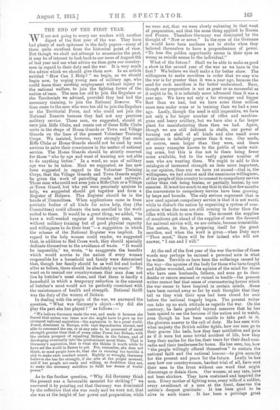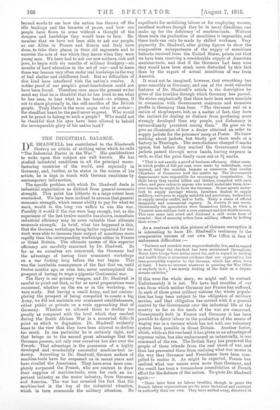THE END OF THE FIRST YEAR.
E are not going to weary our readers with another digest of the first year of the war. They have had plenty of such epitomes in the daily papers—many of them quite excellent from the historical point of view. But though we shall not attempt to summarize the past, it may be of interest to look back to, our issue of August 8th of last year and see what advice we then gave our country- men in regard to their duty and the war. It is very much the advice which we should give them now. In an article entitled "How Can I Help ? " we begin, as we should begin now, by urging young men of military age, who could leave their existing employment without injury to the national welfare, to join the fighting forces of the nation atronce. The men too old to join the Regulars or the Territorials we advised, provided they had had the necessary training, to join the National Reserve. We then came to the men who were too old to join the Regulars or the Territorial Force, and who could not join the National Reserve because they had not any previous military service. These men, we suggested, should at once join Rifle Clubs, and create out of those Rifle Clubs units in the shape of Home Guards or Town and Village Guards on the lines of the present Volunteer Training Corps. We insisted, however, very strongly that such Rifle Clubs or Home Guards should not be used by men anxious to salve their consciences in the matter of national service. The Home Guards should be strictly reserved for those " who by age and want of training are not able to do anything better." In a word, no man of military age was to be taken. Next we suggested, as has now been suggested in regard to the Volunteer Training Corps, that the Village Guards and Town Guards might be given the work of patrolling roads and railways. Those men who could not even join a Rifle Club or a Village or Town Guard, but who yet were genuinely anxious to help, we suggested should get together and form a Register of Helpers. This Register should be in the hands of ;Committees. When applications came in from patriotic 'bodies of all kinds for extra help, they (the Committees) could allocate the men enrolled to the work suited to them. It would be a great thing, we added, "to have a well-weeded register of trustworthy men, men without military training but of good physical capacity and willingness to do their best "—a suggestion in which the scheme of the National Register was implicit. In regard to the help women could render, we suggested that, in addition to Red Cross work, they should specially dedicate themselves to the avoidance of waste. " It would be impossible," we. wrote, " to exaggerate the benefits which would accrue to the nation if every woman responsible for a household and family were determined that, though her family should be as well fed and looked after as before, there should be absolutely no waste." We went on to remind our countrywomen that man does not live by butcher's meat alone, and that there is hardly a household in which a temporary reduction in the amount of butcher's meat would not be perfectly consistent with the maintenance of health and strength. National thrift was the duty of the women of Britain. In dealing with the origin of the war, we 'answered the question, "What was Germany's object—why did she play the part she has played ? " as follows :- "We believe Germany made the war, and made it because she feared that unless war came now she might have to give up her strongest national aspiration—the aspiration to be a great world- Power, dominant in Europe, with vast dependencies abroad, and able to command the sea, or at any rate to be possessed of naval strength greater than that of every other Power but Britain, with the certain prospect of equalling Britain in the future, and of developing eventually into the predominant naval State. That is Germany's aspiration, that is what she thinks it worth while to have set the world in flames to get. For, remember, she does not think, as most people hero do, that she is running too terrible a risk to make such conduct sound. Rightly or wrongly, Germany believes she has the strength, if she acts at the proper moment, and if her people are ready and willing, as doubtless they are to make the necessary sacrifices to fulfil 'her dream of world- power."
As to the further question, "Why did. Germany think the present was a favourable moment for striking ? " we answered it by pointing out that. Germany was dominated by the reflection that she was ready'and we wore not, that she was at the height of her power and preparation, while we were not, that we were slowly wakening to that want of preparation, and that the same thing applied to Russia and France. Therefore Germany was dominated by the thought of "Now or never." In the eyes of the Germans it would have been madness not to strike when they believed themselves to have a preponderance of power. "To lose the golden opportunity seems in their eyes as wrong as suicide seems to the individual."
What of the future ? Shall we be able to make as good a show in the second year of the war as we have in the first ? We believe we shall make a far better show. The willingness to make sacrifices in order that we may win the war is far greater than it was a year ago, because the need for such sacrifices is far better understood. Next, though our preparation is not as great or as successful as it ought to be, it is infinitely more advanced than it was a year ago. We have not only a far stronger and bigger fleet than we had, but we have some three million more men under arms or in training than we had a year ago. Lastly, though the need is still imperative, we have not only a far larger number of rifles and machine- guns and heavy artillery, but we have also a far larger plant for manufacturing them than we had. Again, though we are still deficient in shells, our power of turning out shell of all kinds and also small arms munitions is infinitely greater than it was. Our needs, of course, seem larger than they were, and there are many examples known to the public of units wait- ing arms, but this is due not to there being fewer arms available, but to the vastly greater number of men who are wanting them. We ought to add to this catalogue of increased strength an item more important, in our opinion, than any we have yet named—that is, the willingness, we had almost said the unanimous willingness, of the people of this country to consent to compulsory service rather than risk being beaten, or partially beaten, by our enemies. It is not too much to say that in the last few months the conversions to compulsory service have been growing by leaps and bounds. The only serious argument that is now used against compulsory service is that it is not worth while to disturb the nation by organizing a system of com- pulsion when the men are still coming in faster than the rifles with which to arm them. The moment the supplies of munitions get ahead of the supplies of men the demand for national service will, we are certain, become irresistible. The nation, in fine, is preparing itself for the great sacrifice, and when the word is given—when Duty says " Thou must," there will be few indeed who will not answer, "I can and I will."
At the end of the first year of the war the writer of these words may perhaps be excused a personal note in what he writes. Terrible as have been the sufferings caused by the war—the agonies of the body for those who have fought and fallen wounded, and the agonies of the mind for those who have seen husbands, fathers, and eons go to their deaths or return maimed or ruined in health—the present writer cannot feel that sense of overmastering horror which the war seems to have inspired in certain minds. Some have been carried away so far by such thoughts that they tell us they wish •their eyes had been closed for ever before the national tragedy began. The present writer can take up no such attitude as regards the war. On the contrary, he feels grateful beyond measure that he has been spared to see the heroism of the nation and to wale)), even though he has boon unable to take part in it, the glorious answer to the call of duty. He has seen with what majesty the British soldier fights, how our men go to their graves like beds, how they bear mutilation and pain as if .it were but some trivial accident of life, how they keep their smiles for the foe, their tears for their dead com- rades and their tenderness for home. He has seen, too, how the people willingly offered themselves" to sustain the national faith and the national honour—to give security for the present and peace for the future. Lastly.he has seen how our countrywomen, hardest trial of all, have sent their men to the front without one word that might discourage or detain them., Our women, at any rate, have not been shirkers. They, have sustained and inspired the men. Every mother of fighting sons, every wife of a soldier, every sweetheart of a man at the front, deserves the nation's' deepest 'gratitude: It has been good to be alive in such times. :It has been a privilege great beyond words to see how the nation has thrown off the idle loudings and the luxuries of peace, and how our people have flown to arms without a thought of the dangers and hardships they would have to face. Re- member that we have not been able to ask our people, as our Allies in France and Russia and Italy have done, to take their places in their old regiments and to exercise the arts of war which they learnt when they were young men. We have had to ask our new soldiers, rich and poor, to begin with six mouths of military drudgery—six mouths of hard education in the art of war—and to learn these war lessons very often under real hardships in the way of bad shelter and indifferent food. But no difficulties of this kind have interfered with the nation's resolve. A nobler proof of our people's great-heartedness could not have been found. Therefore once more the present writer must say that he is thankful that he has lived to see what he has seen, to hear what he has heard—to witness, if not to share physically in, the self-sacrifice of the British people. Truly theirs is the mens aqua rebus in arduis- the steadfast heart be the peril never so great. Who would not be proud to belong to such a people ? Who would not be thankful that his eyes have been allowed to behold the incomparable glory of his native land ?



































 Previous page
Previous page